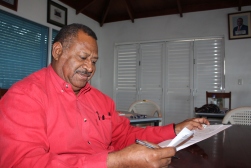“THIS IS THE FIRST TIME that a team has come to inform us, and consult with us, on new laws that are to go to parliament,” confessed a chief who looks after the community of Vureas Bay on Vanua Lava. His revelation brings to light an important question; are your MP’s consulting with you before and after they had participated at a parliamentary sitting? What are the roles of our MP’s?
Unfortunately, there is no specific law in Vanuatu that clearly illustrates the role of an MP. However, there are guided procedures and codes of conducts that provide a guide to what the role of an MP should, and must be.
Read below what the Parliament of Vanuatu has to say about the role of a Member of Parliament; (All details are outlined in the Parliament website)
“What Members of Parliament do? Most Members can thus be viewed as having three roles that of parliamentarian, constituency representative, and party member.”
Furthermore, when “Parliament is sitting (meeting), MPs generally spend their time working in the Parliament. This can include raising issues affecting their constituents, attending debates and voting on new laws.”
“Most MPs are also members of committees, which look at issues in detail, from government policy and new laws, to wider topics like human rights.”
The Parliament website continues to explain that when working in their constituency “Members (MP) provide a direct link between their constituents and the Parliament. In their constituency, MPs often visit their people, where local people can come along to discuss any matters that concern them.”
Again, the Parliament states exactly and clearly what citizens should discuss with their MPs, the people can discuss ‘any matters that concern them’ including laws, community projects, social conflicts, economical activities, opinions, and the list goes on.
Therefore, if your MP visits you to consult, and to gather your opinion, on new laws that are to be discussed in parliament then that is a great job well done, but if your MP is not visiting you to talk about new laws and other matters then you, the voter, must demand it from your MP otherwise you are missing out on an important democratic process.
Reportedly, according to information received from the Parliament the national consultation process could soon be made much easier owing to the rapid advances in Vanuatu’s telecommunication industry. This development would see to it that the Bills listed for debate would be digitally send directly to the MP’s computer, phone, or tablet. This will make it easier for the MP to distribute the Bill to his constituents easier and faster as well as receive the people’s opinion through the same manner.
The Parliament also states that “MPs also attend functions, visit schools and communities and generally try to meet as many people as possible. This gives MPs further insight and context into issues they may discuss when they return to Parliament.”
This information is very important, it explains that MPs must try to meet as many people as possible during their term if office. They are Representatives who must debate and discuss in the interest of those that they represent.
“It is the constituents who pass judgment on the performance of Members of Parliament at each election. Members must prove themselves fit for the task of being their parliamentary representative. All Members who wish to make a long-term commitment to improving the governance of Vanuatu need to be dedicated to serving the interests of their electorates and proving themselves worthy of re-election.”
The Parliament of Vanuatu also provides to each MP a copy of the Vanuatu Parliamentary Handbook. The Handbook outlines the role of a MP among other functions.
The Handbook is a resourceful guide to how things are run in the Parliament. A statement from the Parliament Handbooks explains that the Handbook “is designed to introduce new Parliamentarians, and people planning to be candidates for election to Parliament, to the most fundamental aspects of the job”.
Throughout the awareness tours that were conducted by Transparency International Vanuatu one thing was certain during the discussion of laws and national development; the people want their MPs to do more than just an occasional visit, they want explanation on laws, they need to know how they are governed, and how new laws will affect them.
A Statesman from the Philippines once commented on changes in politics and the need for proper consultation with the people, he said that “our political system needs changing. It needs to move away from personalities and patronage to a system of party programs and consultation with the people.”
Simply, if a single MP cannot do it by himself, then the party that he is affiliated with has to support him to implement a constituency consultation program.



